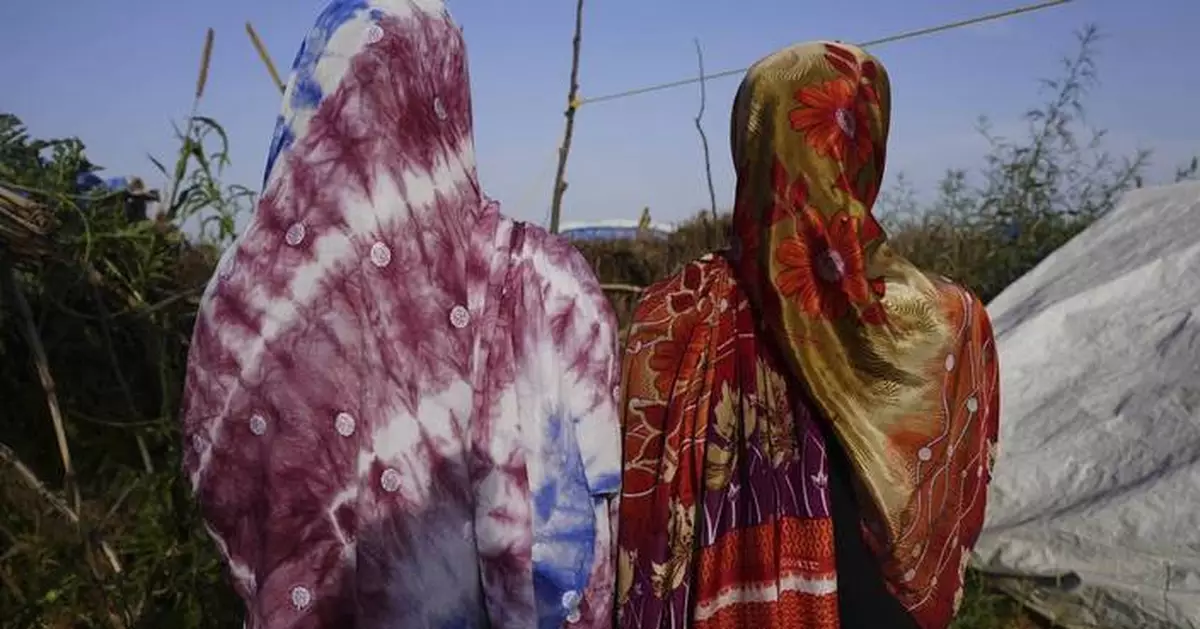ADRE, Chad (AP) — Crossing into Chad, the 27-year-old thought she'd left the horrors of Sudan's war behind: the bodies she ran over while fleeing, the screams of girls being raped, the disappearance of her husband when gunmen attacked. But now she says she has faced more suffering — being forced as a refugee to have sex to get by.
She cradled her 7-week-old son, who she asserted was the child of an aid worker who promised her money in exchange for sex.
Click to Gallery
The sun sets over the camp set up for refugees who fled war in Sudan in Adre, Chad, Thursday, Oct. 3, 2024. (AP Photo/Sam Mednick)
A woman who fled war in Sudan and requested anonymity because she feared retribution after reporting sexual exploitation, walks in a refugee camp in Adre, Chad, Saturday, Oct. 5, 2024. (AP Photo/Sam Mednick)
A woman who fled war in Sudan and requested anonymity because she feared retribution after reporting sexual exploitation, holds her injured arm in a refugee camp in Adre, Chad, Thursday, Oct. 3, 2024. (AP Photo/Sam Mednick)
A woman who fled war in Sudan digs in a refugee camp in Adre, Chad, Thursday, Oct. 3, 2024. (AP Photo/Sam Mednick)
A woman who fled war in Sudan and requested anonymity because she feared retribution after reporting sexual exploitation, holds her baby in a refugee camp in Adre, Chad, Saturday, Oct. 5, 2024. (AP Photo/Sam Mednick)
Women who fled war in Sudan rest in a refugee camp in Adre, Chad, Saturday, Oct. 5, 2024. (AP Photo/Sam Mednick)
A woman who fled war in Sudan and requested anonymity because she feared retribution after reporting sexual exploitation, sits in a refugee camp in Adre, Chad, Thursday, Oct. 3, 2024. (AP Photo/Sam Mednick)
People cross into Chad from Sudan in Adre, Chad, Sunday, Oct. 6, 2024. (AP Photo/Sam Mednick)
Women who fled war in Sudan and requested anonymity because they feared retribution after reporting sexual exploitation, walk in a refugee camp in Adre, Chad, Saturday, Oct. 5, 2024. (AP Photo/Sam Mednick)
“The children were crying. We ran out of food," she said of her four other children. “He abused my situation.” She and other women who spoke to The Associated Press requested anonymity because they feared retribution.
Some Sudanese women and girls assert that men, including those meant to protect them such as humanitarian workers and local security forces, have sexually exploited them in Chad's displacement sites, offering money, easier access to assistance and jobs. Such sexual exploitation in Chad is a crime.
Hundreds of thousands of people, most of them women, have streamed into Chad to escape Sudan's civil war, which has killed over 20,000 people. Aid groups struggle to support them in growing displacement sites.
Three women spoke with the AP in the town of Adre near the Sudanese border. A Sudanese psychologist shared the accounts of seven other women and girls who either refused to speak directly with a reporter or were no longer in touch with her. The AP could not confirm their accounts.
Daral-Salam Omar, the psychologist, said all the seven told her they went along with the offers of benefits in exchange for sex out of necessity. Some sought her help because they became pregnant and couldn't seek an abortion at a clinic for fear of being shunned by their community, she said.
“They were psychologically destroyed. Imagine a woman getting pregnant without a husband amid this situation,” Omar said.
Sexual exploitation during large humanitarian crises is not uncommon, especially in displacement sites. Aid groups have long struggled to combat the issue. They cite a lack of reporting by women, not enough funds to respond and a focus on first providing basic necessities.
The U.N. refugee agency said it doesn't publish data on cases, citing the confidentiality and safety of victims.
People seeking protection should never have to make choices driven by survival, experts said. Nidhi Kapur, who works on preventing sexual exploitation and abuse in emergency contexts, said exploitation represents a deep failure by the aid community.
Yewande Odia, the United Nations Population’s Fund representative in Chad, said sexual exploitation is a serious violation. U.N. agencies said displacement camps have “safe spaces” where women can gather, along with awareness sessions, a free hotline and feedback boxes to report abuse anonymously.
Yet many of the Sudanese women said they weren’t aware of the hotline, and some said using the boxes would draw unwanted attention.
The Sudanese woman with the newborn said she was afraid to report the aid worker for fear he'd turn her in to police.
She said she approached the aid worker, a Sudanese man, after searching for jobs to buy basic necessities like soap. She asked him for money. He said he'd give her cash but only in exchange for sex.
They slept together for months, she said, and he paid the equivalent of about $12 each time. After she had the baby, he gave her a one-time payment of approximately $65 but denied it was his, she said.
The man was a Sudanese laborer for Doctors Without Borders, known by its French acronym MSF, she said.
Two other Sudanese women said Chadian men working at MSF sites— one wearing MSF clothing — solicited them after they applied for work with the organization. The men took their phone numbers and repeatedly called, saying they'd give them jobs for sex. Both women said they refused.
Christopher Lockyear, MSF's secretary general, said the organization was not aware of the allegations and wanted to investigate. “Asking for money or sex in exchange for access to care or a job is a clear violation of our behavioral commitments," he said.
MSF would not say how many such cases had been reported among Sudanese refugees in Chad. Last year, out of 714 complaints made about MSF staff behavior where it works globally, 264 were confirmed to be cases of abuse or inappropriate behavior including sexual exploitation, abuse of power and bullying, Lockyear said.
Lockyear said MSF is creating a pool of investigators at the global level to enhance its ability to pursue allegations.
One woman told the AP that a man with another aid group also exploited her, but she was unable to identify the organization. Omar, the psychologist, said several of the women told her they were exploited by aid workers, local and international. She gave no evidence to back up the claims.
Another woman, one of the two who alleged they were approached after seeking work with MSF, said she also refused a local policeman who approached her and promised an extra food ration card if she went to his house.
Ali Mahamat Sebey, the head official for Adre, said police are not allowed inside the camps and asserted that allegations against them of exploitation were false. With the growing influx of people, however, it's hard to protect everyone, he said.
The women said they just want to feel safe, adding that access to jobs would lessen their vulnerability.
After most of her family was killed or abducted in Sudan's Darfur region last year, one 19-year-old sought refuge in Chad. She didn't have enough money to support the nieces and nephews in her care. She got a job at a restaurant in the camp but when she asked her Sudanese boss for a raise, he agreed on the condition of sex.
The money he paid was more than six times her salary. But when she got pregnant with his child, the man fled, she asserted. She rubbed her growing belly.
“If we had enough, we wouldn’t have to go out and lose our dignity," she said.
The Associated Press receives financial support for global health and development coverage in Africa from the Gates Foundation. The AP is solely responsible for all content. Find AP’s standards for working with philanthropies, a list of supporters and funded coverage areas at AP.org.
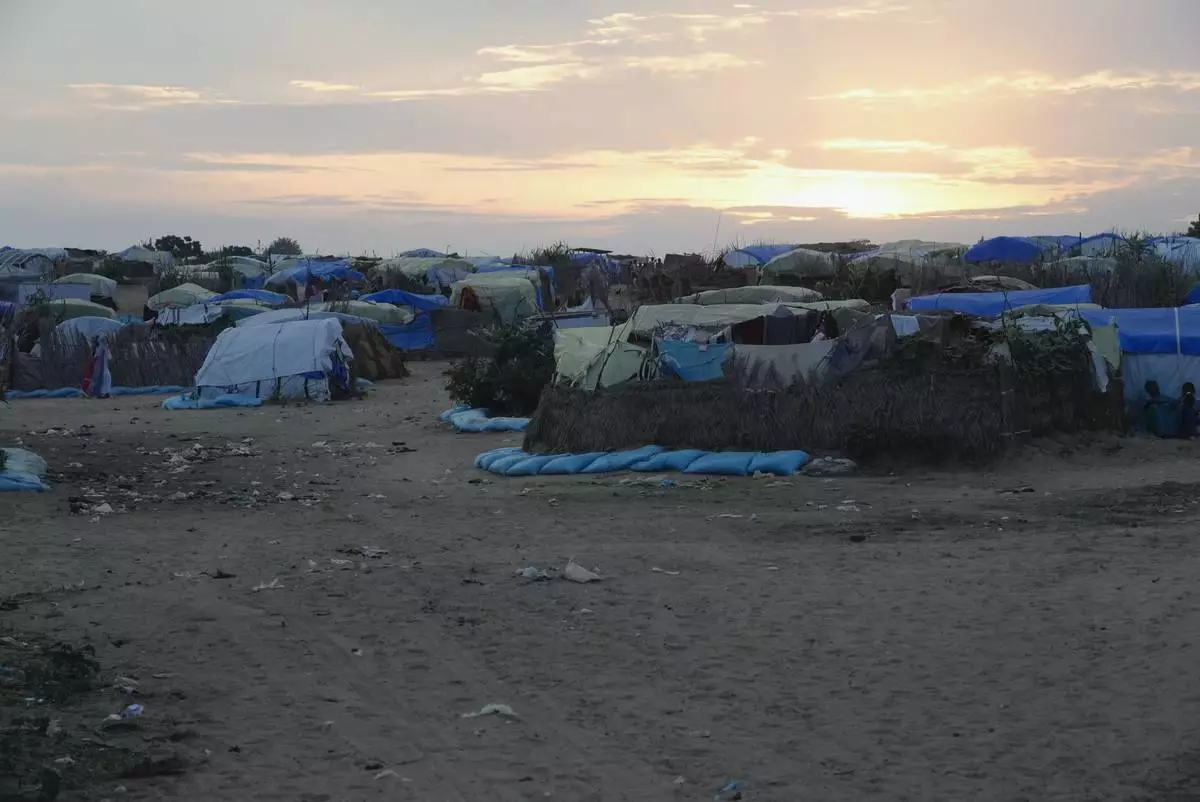
The sun sets over the camp set up for refugees who fled war in Sudan in Adre, Chad, Thursday, Oct. 3, 2024. (AP Photo/Sam Mednick)
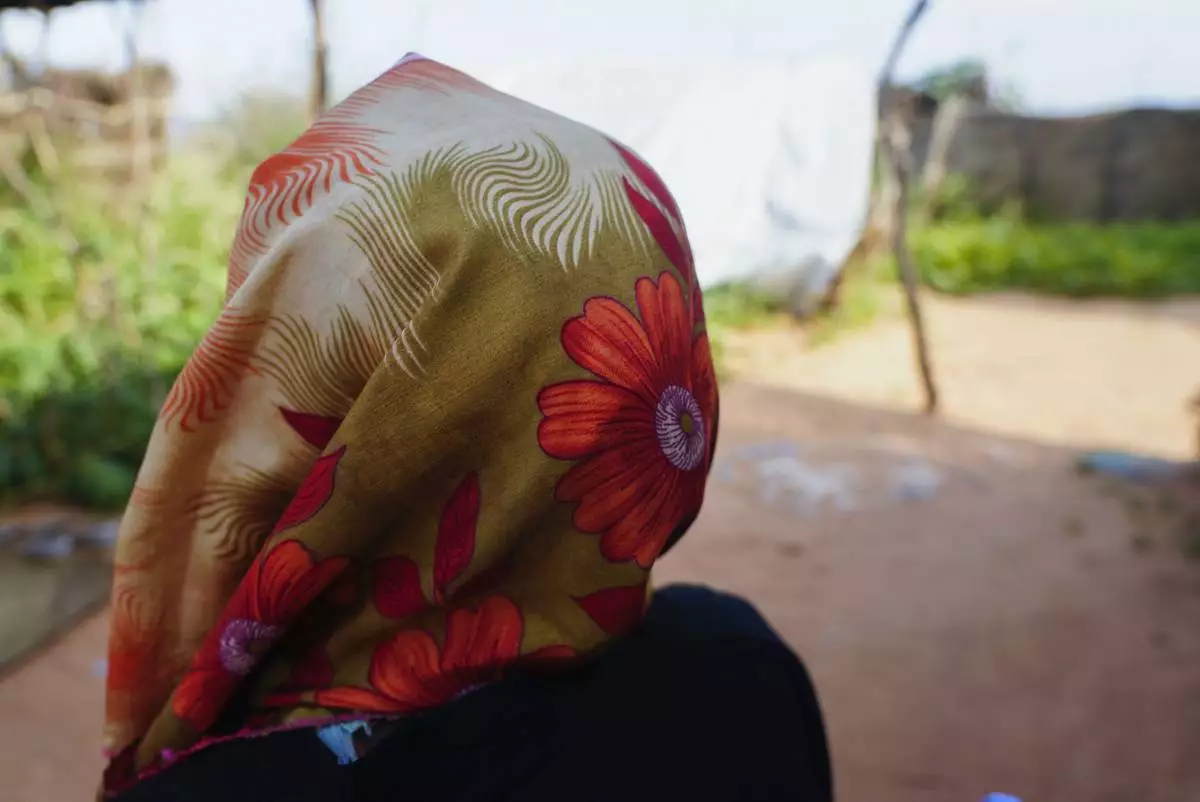
A woman who fled war in Sudan and requested anonymity because she feared retribution after reporting sexual exploitation, walks in a refugee camp in Adre, Chad, Saturday, Oct. 5, 2024. (AP Photo/Sam Mednick)
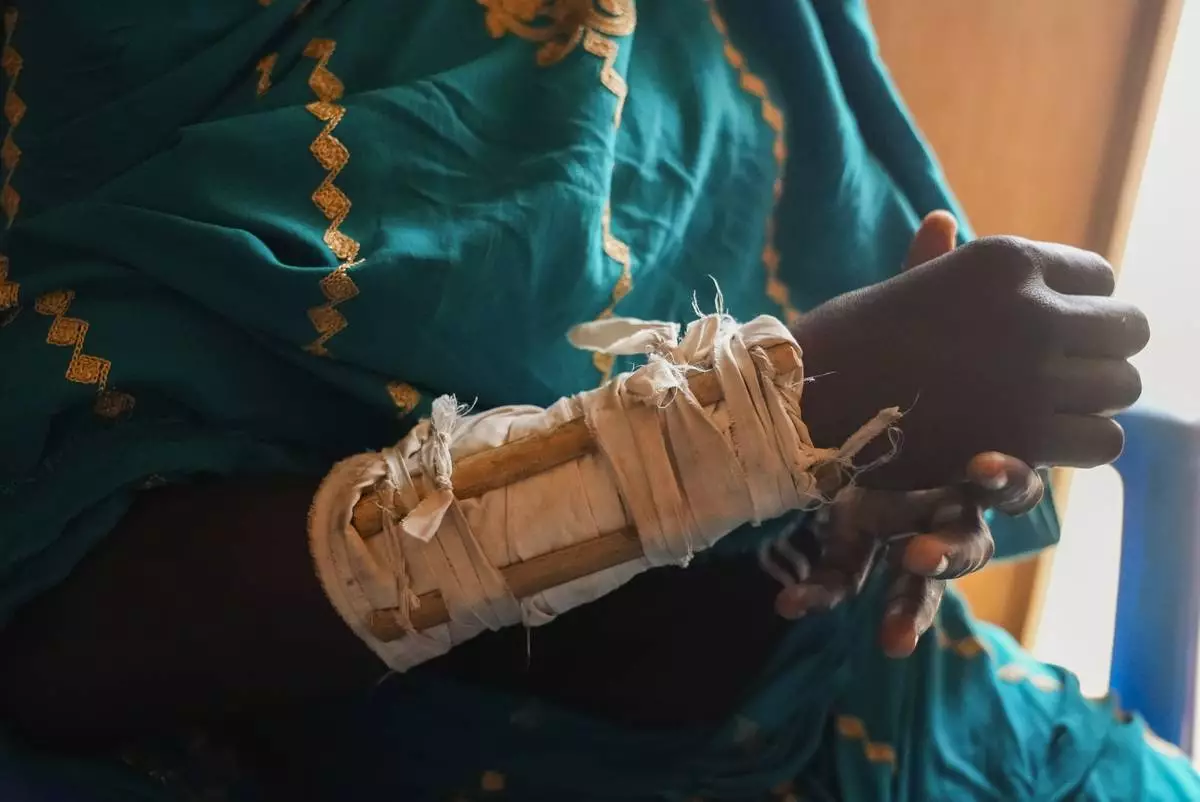
A woman who fled war in Sudan and requested anonymity because she feared retribution after reporting sexual exploitation, holds her injured arm in a refugee camp in Adre, Chad, Thursday, Oct. 3, 2024. (AP Photo/Sam Mednick)
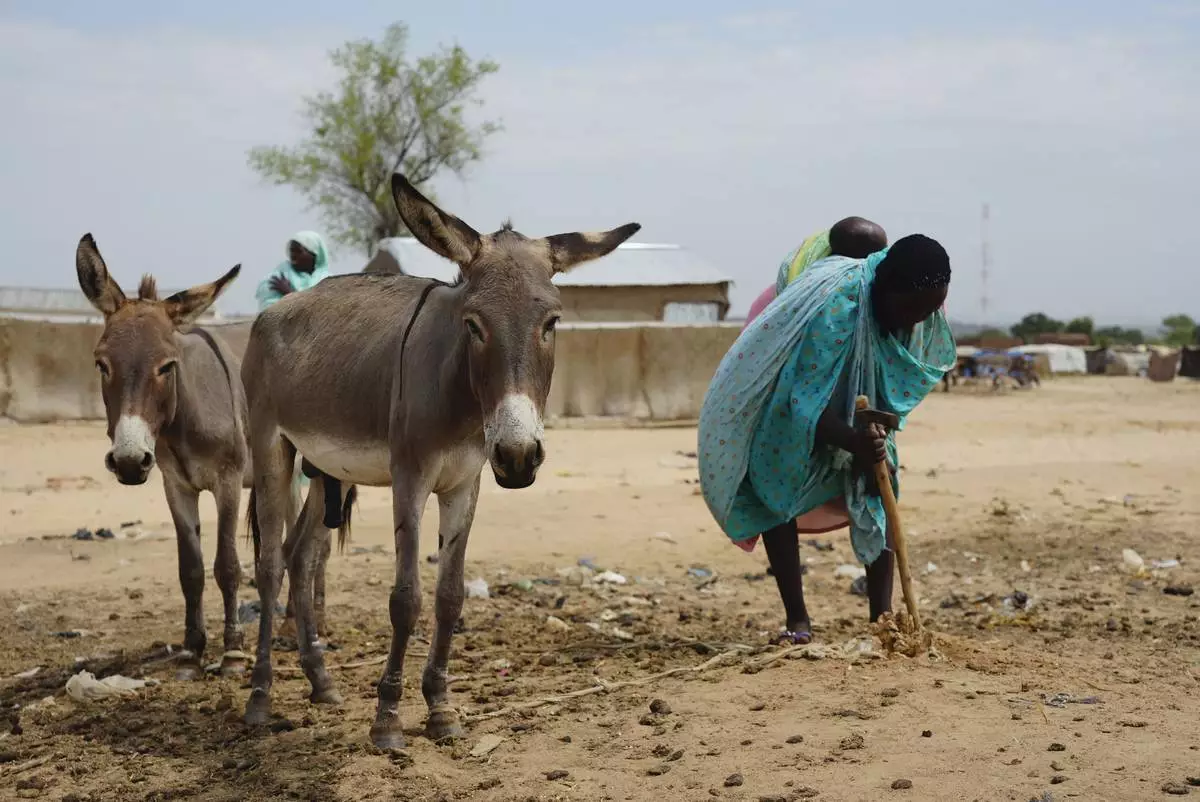
A woman who fled war in Sudan digs in a refugee camp in Adre, Chad, Thursday, Oct. 3, 2024. (AP Photo/Sam Mednick)

A woman who fled war in Sudan and requested anonymity because she feared retribution after reporting sexual exploitation, holds her baby in a refugee camp in Adre, Chad, Saturday, Oct. 5, 2024. (AP Photo/Sam Mednick)
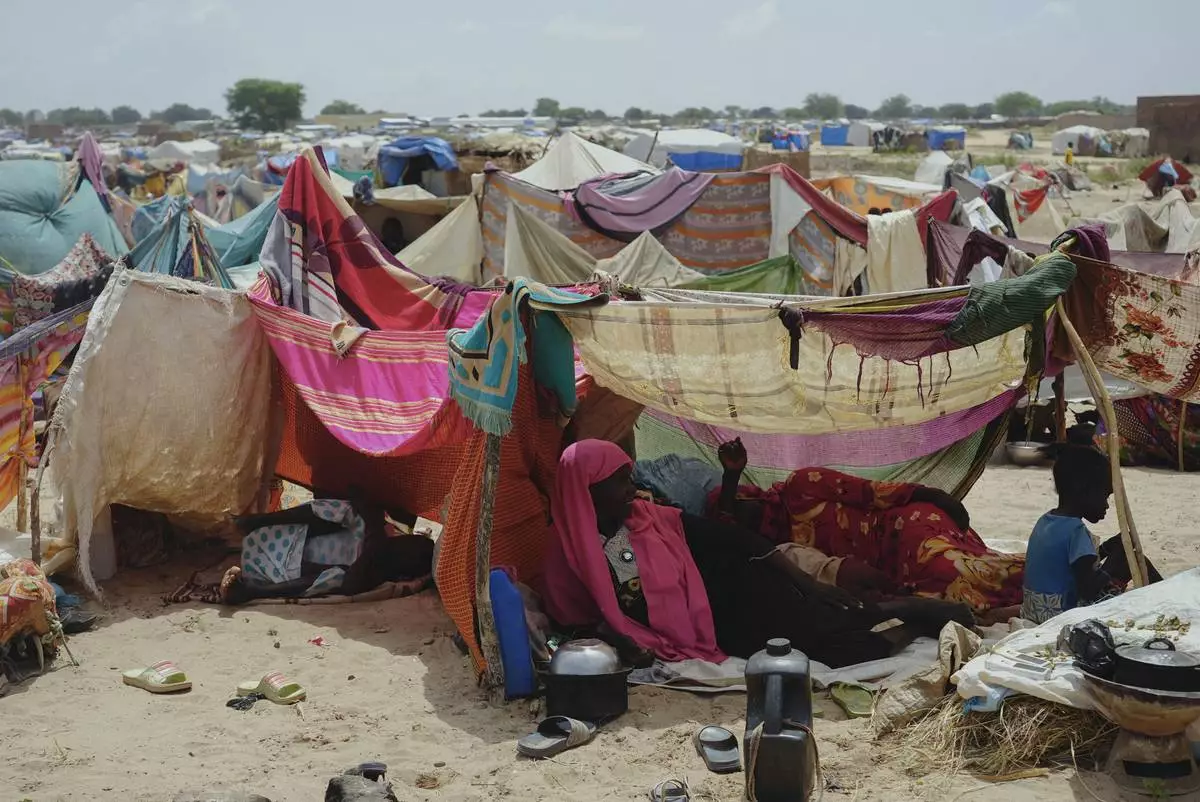
Women who fled war in Sudan rest in a refugee camp in Adre, Chad, Saturday, Oct. 5, 2024. (AP Photo/Sam Mednick)

A woman who fled war in Sudan and requested anonymity because she feared retribution after reporting sexual exploitation, sits in a refugee camp in Adre, Chad, Thursday, Oct. 3, 2024. (AP Photo/Sam Mednick)
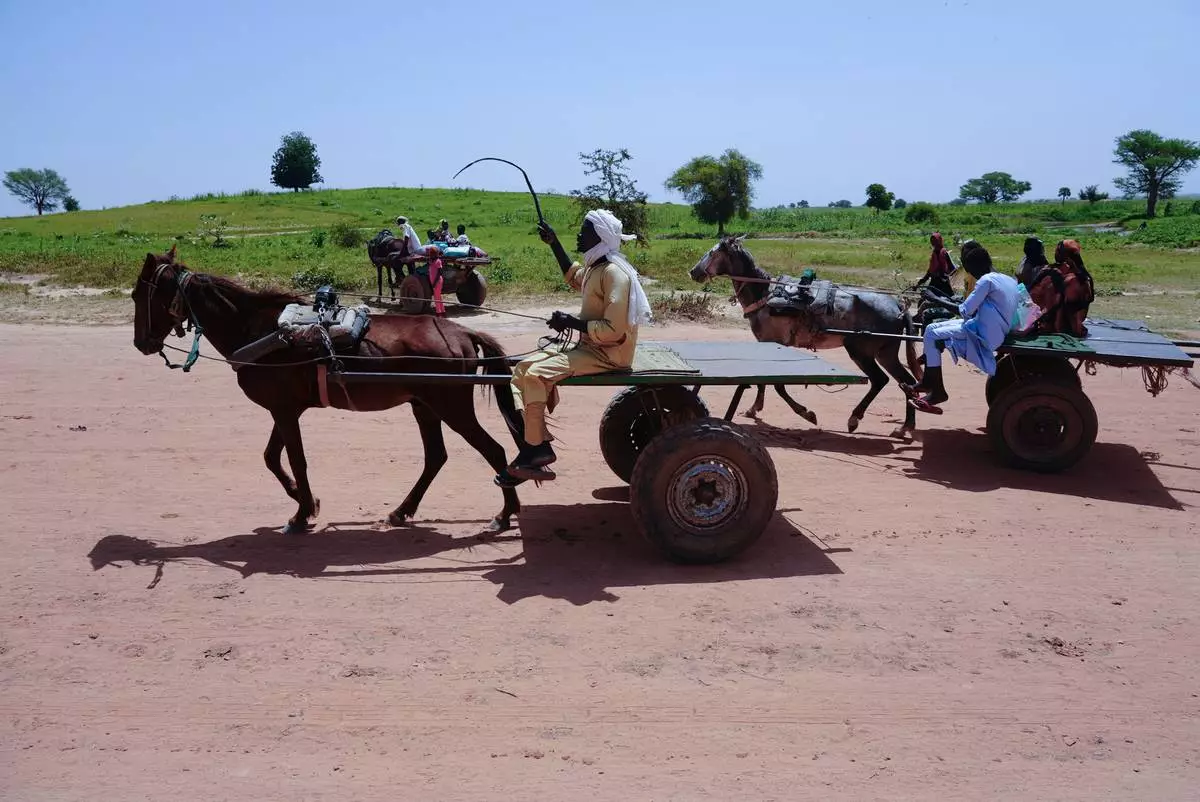
People cross into Chad from Sudan in Adre, Chad, Sunday, Oct. 6, 2024. (AP Photo/Sam Mednick)
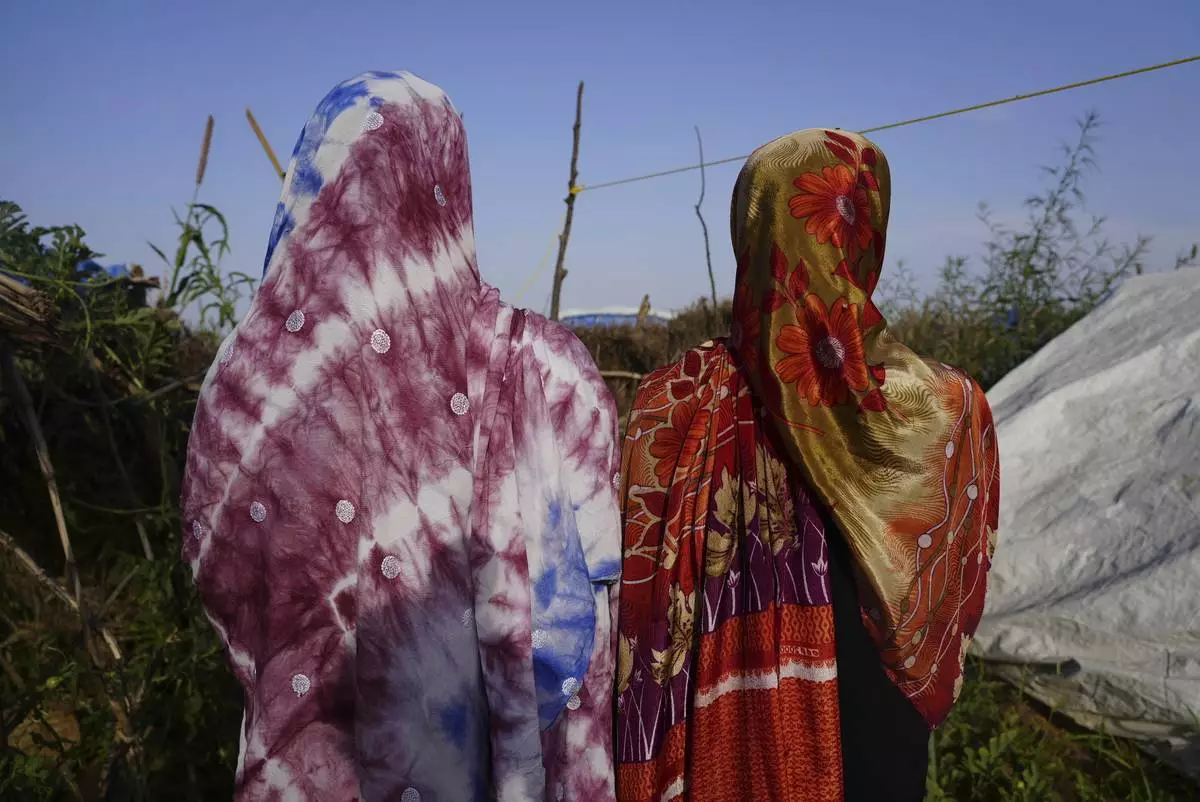
Women who fled war in Sudan and requested anonymity because they feared retribution after reporting sexual exploitation, walk in a refugee camp in Adre, Chad, Saturday, Oct. 5, 2024. (AP Photo/Sam Mednick)
CHURCHILL, Manitoba (AP) — Sgt. Ian Van Nest rolls slowly through the streets of Churchill, his truck outfitted with a rifle and a barred back seat to hold anyone he has to arrest. His eyes dart back and forth, then settle on a crowd of people standing outside a van. He scans the area for safety and then quietly addresses the group's leader, unsure of the man's weapons.
“How are you today?” Van Nest asks. The leader responds with a wary, “We OK for you here?”
“You’re good. You got a lot of distance there. When you have people disembarking from the vehicle you should have a bear monitor,” Van Nest, a conservation officer for the province of Manitoba, cautions as the tourists gaze at a polar bear on the rocks. "So, if that’s you, just have your shotgun with you, right? Slugs and cracker shells if you have or a scare pistol.”
It's the beginning of polar bear season in Churchill, a tiny town on a spit of land jutting into Hudson Bay, and keeping tourists safe from hungry and sometimes fierce bears is an essential job for Van Nest and many others. And it's become harder as climate change shrinks the Arctic sea ice the bears depend on to hunt, forcing them to prowl inland earlier and more often in search of food, according to the International Union for the Conservation of Nature, a group of scientists that tracks how endangered species are.
“You're seeing more bears because there are more bears on the land for longer periods of time to be seen” and they are willing to take more risks, getting closer to people, said Polar Bears International research and policy director Geoff York. There are about 600 polar bears in this Western Hudson Bay population, about half what it was 40 years ago, but that's still close to one bear for every resident of Churchill.
Yet this remote town not only lives with the predator next door, but depends upon and even loves it. Visitors eager to see polar bears saved the town from shrinking out of existence when a military base closed in the 1970s, dropping the population from a few thousand to about 870. A 2011 government study calculated that the average polar bear tourist spends about $5,000 a visit, pumping more than $7 million into a tiny town that boasts fancy restaurants and more than two dozen small places to stay amid dirt roads and no stoplights.
“We’re obviously used to bears so (when you see one) you don’t start to tremble,” Mayor Mike Spence said. “It’s their area too. It’s important how the community coexists with bears and wildlife in general to really get along. We’re all connected.”
It's been more than a decade since a bear mauled two people in an alley late on Halloween night before a third person scared off the animal.
“It was the scariest thing that's ever happened in my life,” said Erin Greene, who along with a 72-year-old man who tried to fight off the bear with a shovel survived their injuries. Greene, who had come to Churchill the year before for a job in the tourist trade, said it was the other animals of Churchill — the beluga whales that she sings to as she runs paddleboat tours and her dozen rescued retired sled dogs — that helped her recover from the trauma.
There have been no attacks since then, but the town is watchful.
At Halloween, trick-or-treating occurs when bears are hungriest, and dozens of volunteers line the streets to keep trouble at bay. Any time of year, troublesome bears that wander into town too often may be put into the polar bear jail — a big Quonset hut-style structure with 28 concrete-and-steel cells — before being returned to the wild. The building doesn't fill up, but it can get busy enough to be noisy from banging and growling inside, Van Nest said.
Residents show polar bear pride in a way that mixes terror and fun, kind of like a rollercoaster.
“You know we're the polar bear capital of the world, right? We have the product, it's just about getting out there to see the bears safely,” said Dave Daley, who owns a gift shop, runs dog sleds and talks up the city like the former Chamber of Commerce president he is. “I always tell tourists or whatever ‘You know what, they’re the T. rex like, of the dinosaur era. They're the Lords of the Arctic. They'll eat you.”
Usually they don't.
The military base's rocket launch site seemed to keep bears away, and when it closed in the 1970s, they came around more, longtime residents said. So Churchill and province officials “put together a polar bear alert program to make sure the community members were looked after, protected,” said Spence, mayor since 1995.
The town's old curfew siren blares nightly at 10 p.m., suggesting to people that it's time to go home for safety from bears. But on this Saturday night, three different bonfire parties are going on at the town beach — a spot next to the school, library and hospital that is a particular hot spot for bears coming inland. Yet no one is leaving.
Then a truck shows up, and a lone figure — one of government's paid guards — gets out, armed with a shotgun. He walks out on the dunes about 100 yards from the parties and scans the horizon for polar bears. The guards are expected to scare any bears away with warning shots, flares, bear spray or noise — not kill them.
“It's just everybody watches out for everybody,” Spence said. “So it's just, it's just normal. It kicks into gear as a community that lives alongside polar bears, you're always accustomed to coming out of your house and you look like this and you look ahead. And that's just in your DNA now.”
Georgina Berg recalls growing up in the 1970s outside of Churchill, where many First Nations people lived, and how differently her father and mother reacted to a bear sighting. Her father, she said, would see a bear poking in garbage and just walk on by.
“He said, ‘If you don’t bother them, then they won’t bother you’," she recalled.
When a bear came near in later years, after her father had died, her mom was scared.
“Everything was like pandemonium. Everybody was yelling, and all the kids had to come in and everybody had to go home. And then we stayed silent in the house for a long time until we knew for sure that bear was gone, ” Berg recalled.
For Van Nest, the provincial officer, the group he came upon that day was plenty safe from a bear about 300 yards (meters) away. He said the bear was “putting on a bit of a show” for the tourists.
“This is a great situation to be in," he said. “The tourists are a safe distance away and the bear’s doing his natural thing and not being harassed by anybody.”
Read more of AP’s climate coverage at http://www.apnews.com/climate-and-environment
Follow Seth Borenstein on X at @borenbears
The Associated Press’ climate and environmental coverage receives financial support from multiple private foundations. AP is solely responsible for all content. Find AP’s standards for working with philanthropies, a list of supporters and funded coverage areas at AP.org.

A person watches for polar bears near Hudson Bay, Saturday, Aug. 3, 2024, in Churchill, Manitoba. (AP Photo/Joshua A. Bickel)
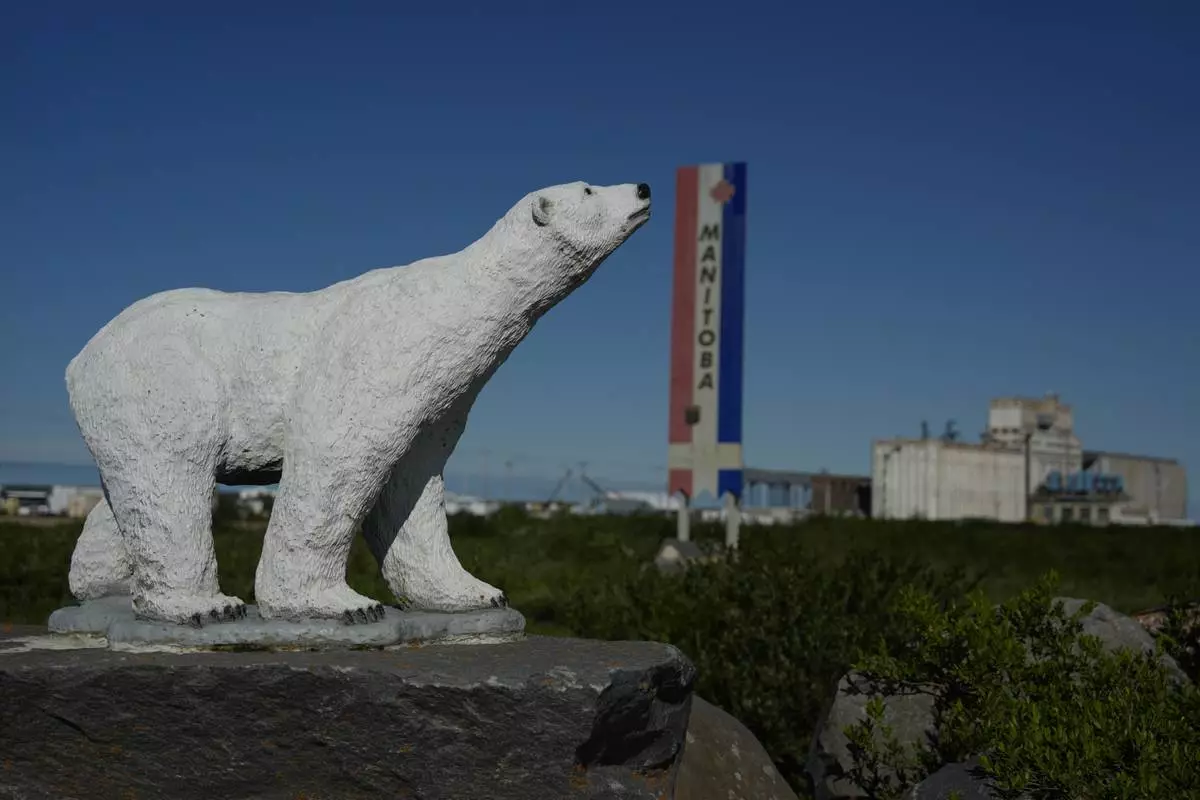
A polar bear statue stands near a road, Saturday, Aug. 3, 2024, in Churchill, Manitoba. (AP Photo/Joshua A. Bickel)
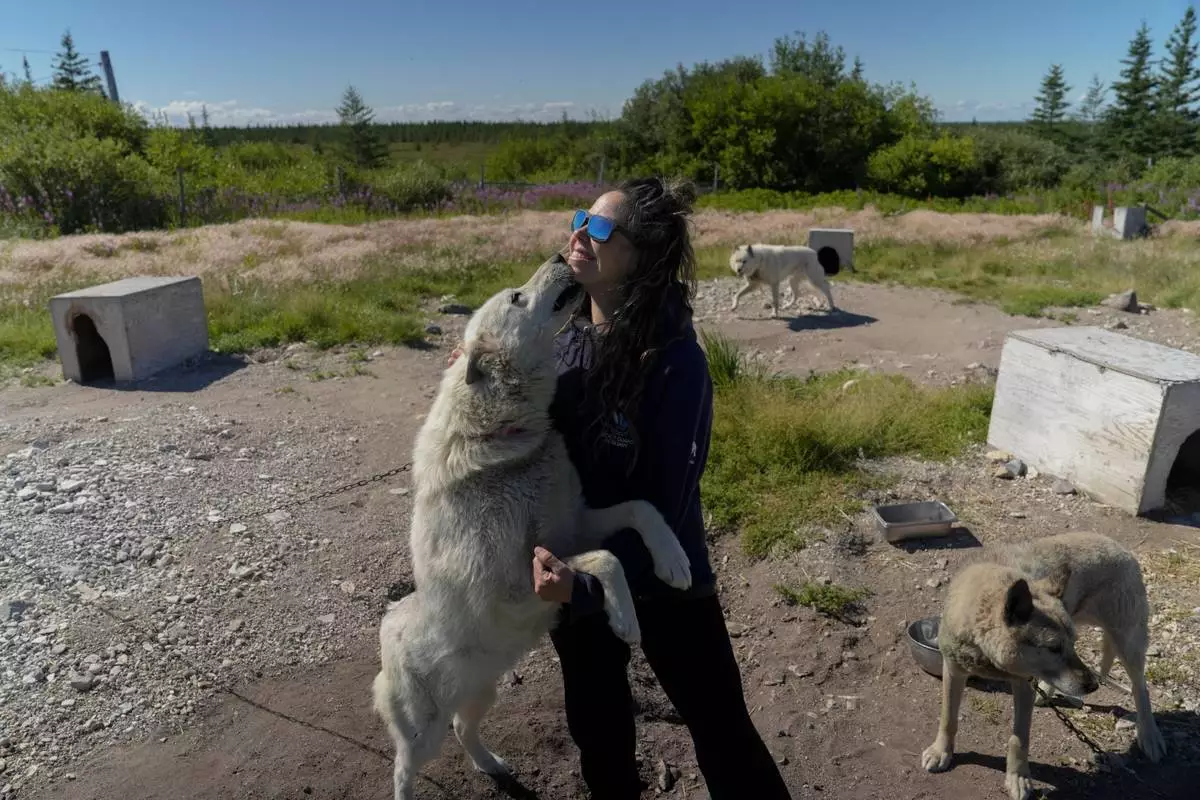
Erin Greene holds one of her rescued sled dogs, Thursday, Aug. 8, 2024, in Churchill, Manitoba. (AP Photo/Joshua A. Bickel)
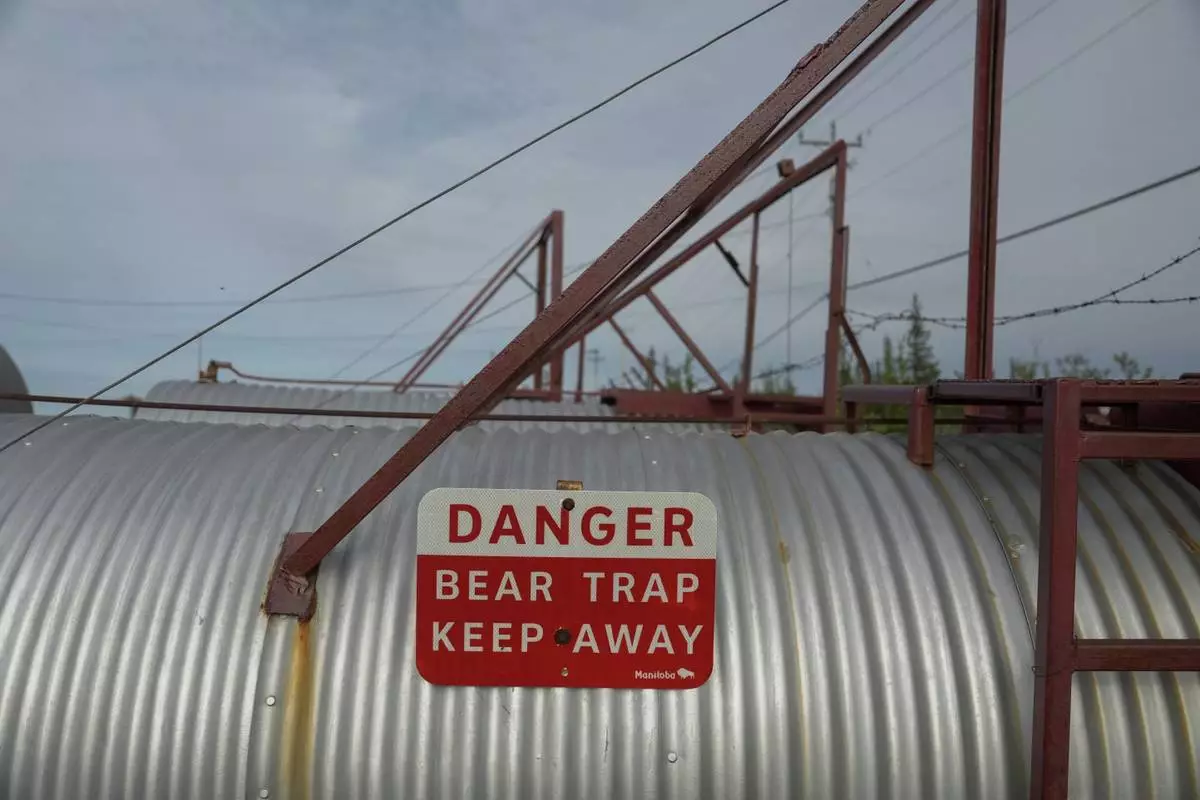
A polar bear trap sits outside the Polar Bear Holding Facility, Sunday, Aug. 4, 2024, in Churchill, Manitoba. (AP Photo/Joshua A. Bickel)

Tourists stand outside the Polar Bear Holding Facility, Sunday, Aug. 4, 2024, in Churchill, Manitoba. (AP Photo/Joshua A. Bickel)
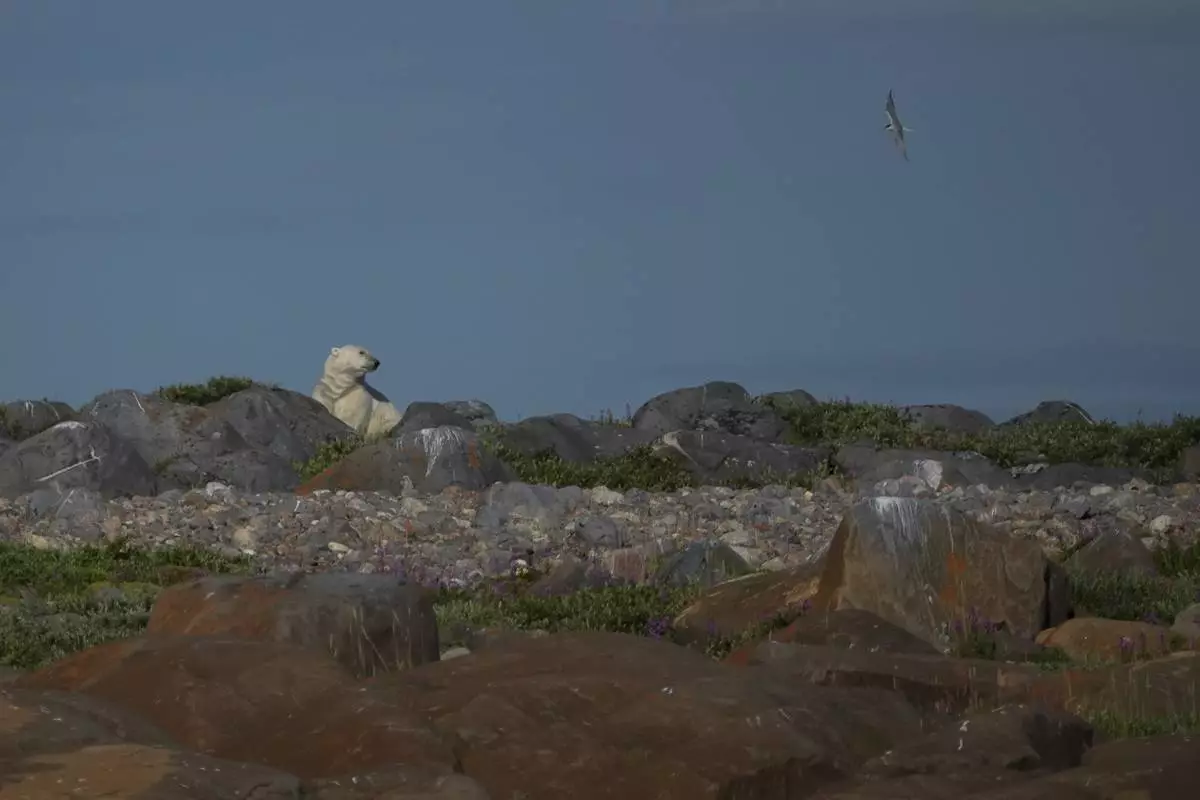
A polar bear stands near rocks, Tuesday, Aug. 6, 2024, in Churchill, Manitoba. (AP Photo/Joshua A. Bickel)
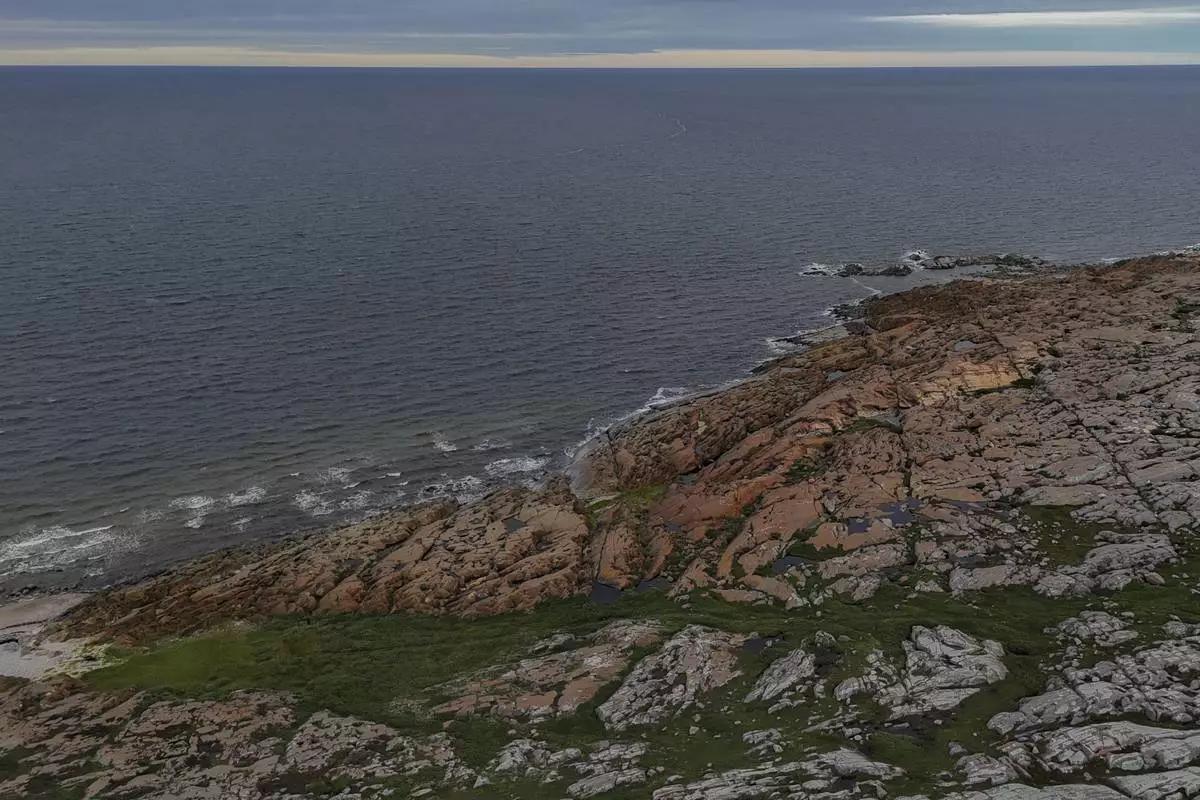
Waves from Hudson Bay crash onto shore, Wednesday, Aug. 7, 2024, in Churchill, Manitoba. (AP Photo/Joshua A. Bickel)
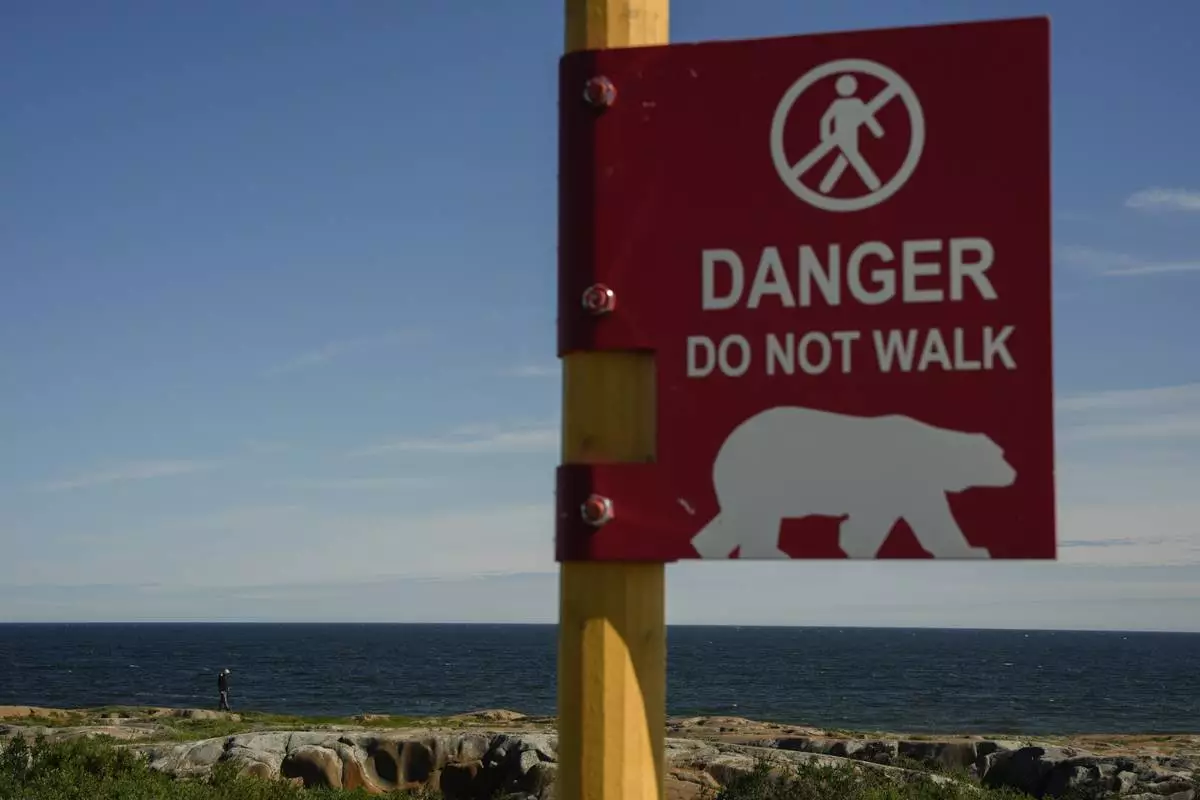
A person walks along the rocks near Hudson Bay while watching for polar bears, Saturday, Aug. 3, 2024, in Churchill, Manitoba. (AP Photo/Joshua A. Bickel)

Conservation officer Sgt. Ian Van Nest scans the area for polar bears, Tuesday, Aug. 6, 2024, in Churchill, Manitoba. (AP Photo/Joshua A. Bickel)
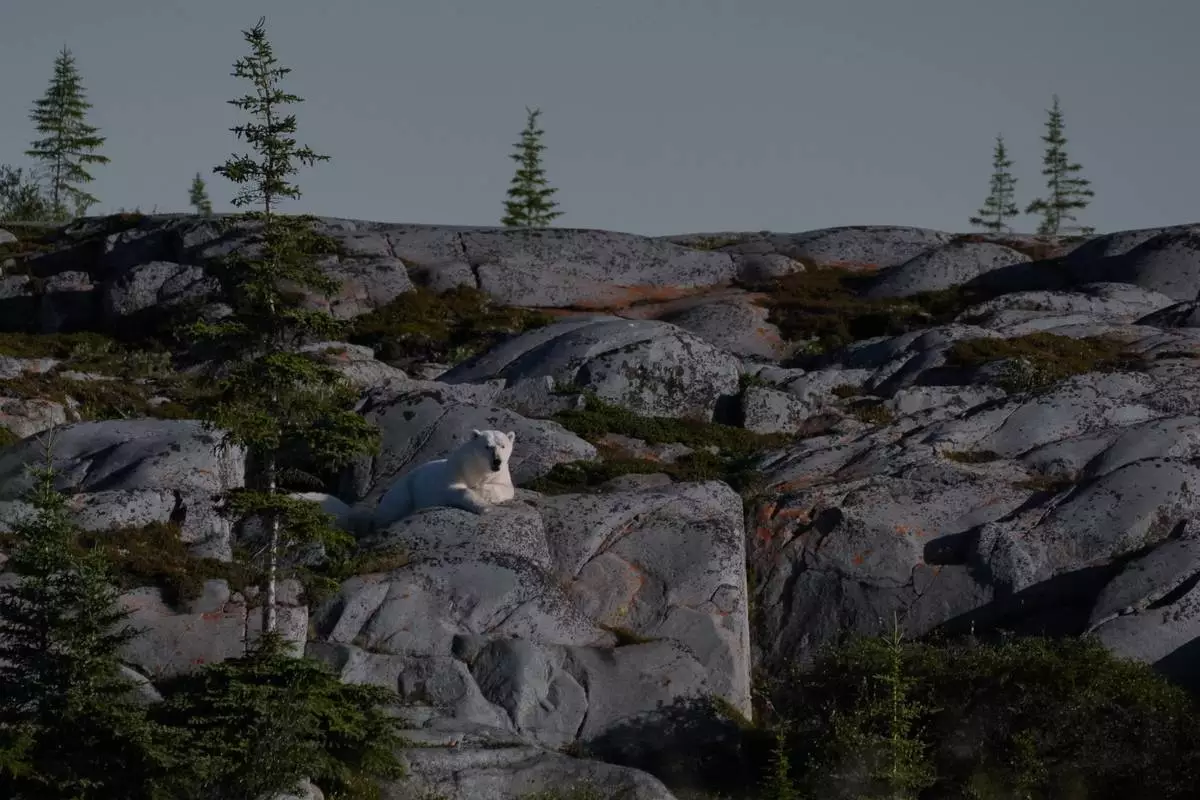
A female polar bear sits on rocks, Wednesday, Aug. 7, 2024, in Churchill, Manitoba. (AP Photo/Joshua A. Bickel)











